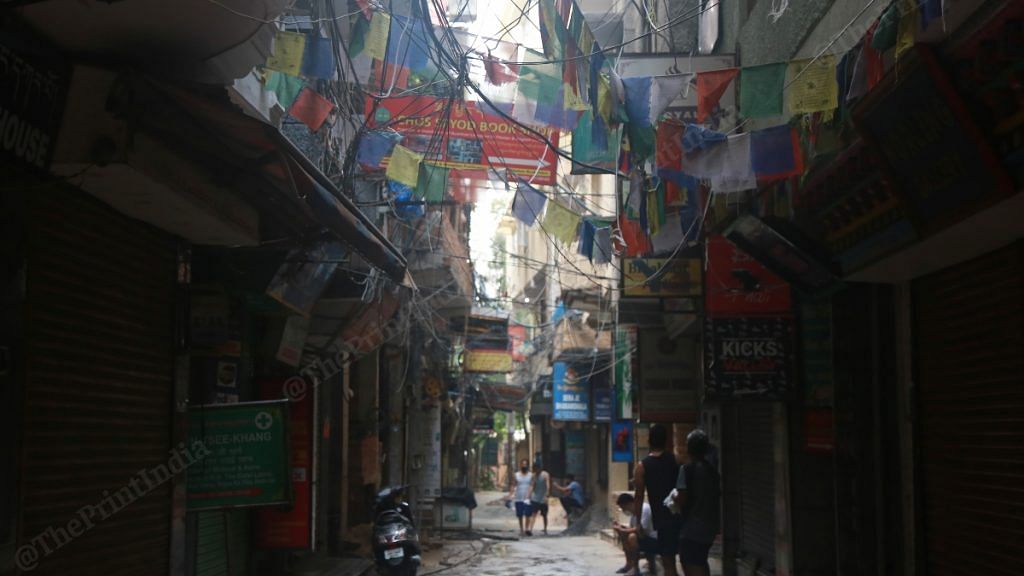New Delhi: The Narendra Modi government’s ban on 59 Chinese apps this week was hailed by the residents of Delhi’s famous Tibetan refugee colony or ‘Mini Tibet’, popularly known as Majnu ka Tilla. But the celebration was laced with anxiety.
For, the 370-odd families here have now lost a major communication link with home, because among the apps banned is WeChat, a multi-purpose messaging, social media and mobile-payment app, which was launched in 2011.
WeChat is popular in Majnu ka Tila because WhatsApp and Facebook are banned in Tibet. Residents say since call rates are as high as Rs 40 per minute, WeChat was a feasible option for them to connect with families.
The government banned 59 Chinese applications, including the hugely popular TikTok, Weibo, SHAREit, amid the bitter border stand-off with China, which has been going on since early May.
Located on the banks of the Yamuna near Kashmere Gate in north Delhi, Majnu ka Tila, also known as New Aruna Nagar, became a Tibetan refugee colony after the 1959 Tibetan uprising when the Dalai Lama sought refuge in Dharamshala.
The Government of India had then allotted land to the refugees in the area in 1960. After the war with China in 1962, many Tibetans, who were temporarily settled near the border, moved to Majnu ka Tila.
According to the area’s Residents’ Welfare Association (RWA) Secretary Karma Londue, Majnu ka Tila houses about 350-370 families.
Also read: Delighted over ban on Chinese apps, news channels put Modi speech on back burner
App ban good move, but need an alternative
Londue told ThePrint he completely supported the Indian government’s decision to ban the apps and believed the move would economically hurt China. But he was concerned about how to contact his relatives in Tibet.
“My parents left Tibet when the Communist Party of China invaded it in 1959 and I was born in Shimla in 1975. However, I have many aunts, uncles and cousins still in Tibet and would speak to them via WeChat as WhatsApp is banned there. I normally use WhatsApp but have downloaded WeChat only to speak to them.”
Like Londue, 28-year-old Sonam, who works as a nurse at a public health centre in the area, used to speak to her parents, brother and sister in Tibet via WeChat. Sonam was just 8-9 years old when she crossed the border in 1993. “I came with a few families, but was all alone.”
Sonam said she used WeChat everyday to speak to her family, ask about their well-being and apprise them of her situation, but they could never discuss anything political.
“We can’t have any political discussions. I can’t speak about India and absolutely nothing about the Dalai Lama as the authorities (back home) will come and harass them (her family) there,” she said.
Sonam said she uninstalled WeChat three days ago after the ban and has not spoken to her family since then. “I don’t know how I will speak to my brother, sister and parents. I am very worried. I am looking for another app, but don’t know what to do now.”
She said the government should come up with an alternative app. “India has a sizeable Tibetan population, therefore an alternative should be made available soon by the government.”
Another resident of Majnu ka Tila, who did not want to be named, told ThePrint he used WeChat until a year ago, but uninstalled it because authorities in Tibet would monitor his conversations with his mother and sister, and harass them.
He said Tibetan authorities would ask his mother and sister why he and his brother are in India.
“I came to India via Nepal when I was only 8 years old along with my younger brother (then 6 years old) in 1993, with 10 other people. I used to use WeChat but then stopped because it became too much of a hassle. I call (my family) at times now, but very seldom and that too only for five-ten minutes. I last saw my family in 1996,” he said.
He also said the ban on Chinese apps was a good move as it would ensure China not only loses revenue, but is also unable to access any information through its apps.
‘India will only be safe when Tibet is free’
Migmar Tsering, 53, who runs a community kitchen for workers in the area, said the app ban would hit China economically, but added India should focus on Tibet’s independence too.
“Having served in the Special Frontier Force (a special Indian force created on 14 November 1962 to conduct covert operations behind Chinese lines) from 1985 to 1991, my heart goes out to the martyred soldiers. I salute them,” said Tsering.
“But it was known from the beginning that China was not trustworthy and we screamed ourselves hoarse saying ‘Don’t befriend China’, but nobody listened to us’,” he said.
Tsering also pointed out one should not refer to the area of the face-off as the India-China border as it’s the India-Tibet border. “We need to stop calling it the India-China border. India has a border with Tibet not China.”
Echoing Tsering’s sentiments, RWA secretary Londue said while one should boycott all Chinese goods, it was important not to forget about Tibet’s independence.
“India will only be safe, when Tibet is free”, said Londue. He said all of India’s border issues would be resolved if Tibet is a free country.
Also read: China luring Tibetan refugees in India to work as its spies, Intelligence Bureau warns
